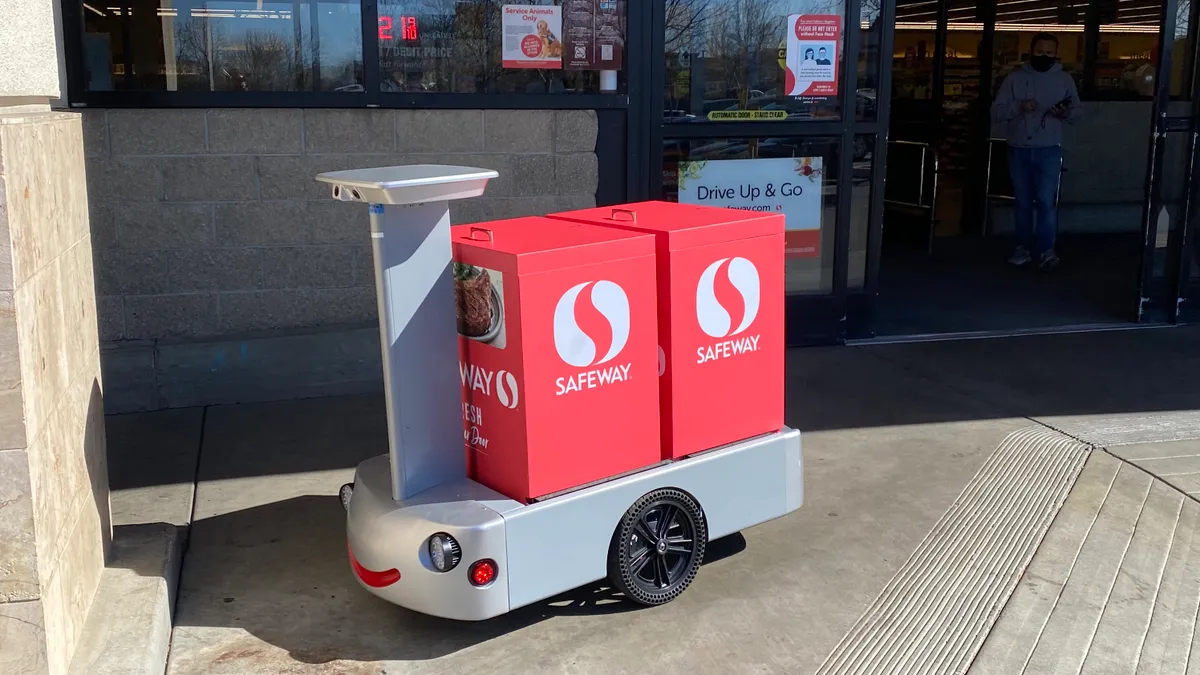Dive Brief:
- Albertsons is testing remote-controlled delivery carts developed by Tortoise, a Silicon Valley-based startup focused on automation systems for light electric vehicles, the grocery chain announced on Friday.
- The battery-powered vehicles, which travel at about 3 mph and have a 3-mile range, can each hold up to 120 pounds of groceries in four lockable compartments. A human escort will accompany the vehicles during the pilot, which Tortoise co-founder Dmitry Shevelenko said started Feb. 24 at a pair of Safeway stores in Tracy and Windsor, California. Each store is currently operating two vehicles.
- Albertsons’ trial of the remote-controlled vehicles from Tortoise is the latest in a series of retailers' testing technology intended to make grocery delivery less costly and more efficient.
Dive Insight:
Unlike hardware from competitors like Nuro, Refraction AI and Starship Technologies, which are focused on technology that allows vehicles to operate on their own, Tortoise’s vehicles depend on remote human operators. Those controllers, based in Mexico City, drive the carts over a 4G wireless link that transmits a 360-degree view provided by front- and rear-mounted cameras, Shevelenko said.
“Full autonomous vehicles are still decades away from mass commercial scalability, so we've engineered a solution that works today,” Shevelenko said, comparing Tortoise’s technology to electric wheelchairs. He emphasized that the vehicles’ slow travel speed is an essential element to making them safe and practical given the limitations of the technology available today and for the foreseeable future.
According to Shevelenko, who formerly led mobility partnerships initiatives at Uber, Tortoise is looking to attract grocers by providing more space for groceries on its vehicles than its competitors offer. The company hopes to be working with five of the 10 largest U.S. grocery chains by the end of 2021, he said.
The venture capital-backed company’s investors include James McCann, a former Ahold USA CEO who now leads Food Retail Ventures, Shevelenko said.
Tortoise’s business model is built around leasing the vehicles to retailers and charging a fee based on their usage, according to Shevelenko. The company believes its technology is two to three times less expensive than other same-day delivery methods for its specific use case, which is limited to deliveries within a few miles of a store.
Tortoise does not intend to place its own brand on the vehicles, preferring instead to allow the retailers it works with to use the emission-free carts to promote their company.
“Even in the lowest-density environments for grocers, they still have a critical mass of customers that are within that 3-mile radius,” Shevelenko said. “The idea here is, it's not about using us for every single delivery. You can have your other fulfillment partners for the 10-mile delivery or the 15-mile delivery, but you use us for the 3 miles and you get great awareness of your brand.”
While Tortoise's current technology requires customers to meet and unload their orders from the vehicle when it arrives in order to retrieve their order, the company is working on technology to allow the carts to be mechanically unloaded, Shevelenko said. The technology, which Tortoise expects to be ready by the second half of 2021, would allow the cart to transfer goods to temperature-controlled storage bins at people’s homes, making unattended deliveries possible.
Tortoise is also looking into equipping its carts with the ability to pick up orders from automated fulfillment centers, and has been in contact with companies like Takeoff Technologies about allowing its vehicles to work with their systems, Shevelenko said.
Tortoise and Albertsons announced their test just two days after URB-E, which is looking to make its mark on the last-mile delivery space with bicycle-powered, collapsible containers, announced that it has raised $5 million in a Series A funding round led by investment bank UBS Group. URB-E describes its products as especially well-suited to urban areas because they permit 20 folded containers to fit into a single parking space.
According to URB-E, the company currently has a fleet of 1,800 containers that move 100,000 packages per day operating in New York City. Each container can replace an entire delivery van, the company said.
Meanwhile, robotic delivery vehicle maker Refraction AI, which has worked with Michigan grocer The Produce Station, announced on Monday that it has raised $4.2 million in seed funding from a group of investors led by Pillar VC, a venture capital firm. The company plans to use the funds for customer acquisition, geographic expansion and product development.













